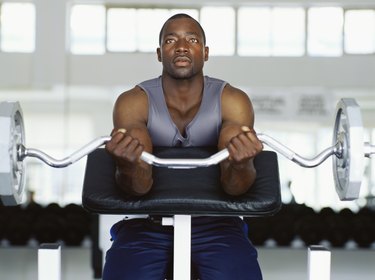
If you've been lifting weights and working out, it's fairly likely that those workouts have caused the chest pain you're experiencing. Strain and inflammation in your muscles or connective tissue can result in pain that feels like it's centered in your chest. However, don't assume that your chest pain doesn't represent a serious health problem -- there's also a chance that it's the first warning sign of heart disease or a heart attack. Visit your physician as soon as possible to have it evaluated and diagnosed.
Potential Heart Issues
Video of the Day
It's critical for you to rule out potential heart issues any time you feel some sort of chest pain, since pain from a heart attack or other cardiac health issues often masquerades as another type of pain, according to Harvard Medical School. Strenuous exercise such as weight-lifting potentially can trigger a heart attack in someone who hasn't exercised much recently. Your physician likely will perform a battery of medical tests to make sure you're not having a heart attack or another heart problem, such as angina.
Video of the Day
Muscle Strain
If your medical care team diagnoses your chest pain as a pulled or strained muscle, it's likely you can take care of the problem at home without additional professional care, according to the University of Maryland Medical Center. Resting for several days, and treating any unbearable pain with the non-prescription pain relievers acetaminophen or ibuprofen, should heal your strained muscle. You also can use heat or cold packs to help ease the discomfort.
Connective Tissue Problems
Rather than a pulled muscle, you also might be experiencing pain from inflamed connecting tissues in your chest, according to Columbia University. Two conditions -- costochondritis and Tietze syndrome -- involve swelling and inflammation in the cartilage between your rib cage and your breastbone. In some cases, infection causes this chest pain and swelling, while in others, overuse of the joints involved causes the pain. To treat either of these conditions, you'll need to stop your weight-lifting routine for up to a week. Muscle relaxants can help, as can non-prescription pain relievers.
Gastrointestinal Issues
Although it's less likely, the chest pain that appears when you lift weights might reflect problems with your gastrointestinal system, according to Columbia University. Gastroesophageal reflux disease, commonly called heartburn or reflux, often can flare up when someone's exercising. In addition, if you've developed an ulcer, that potentially can cause pain that feels as if it's centered in your chest. In either case, you'll need to see your personal physician for a firm diagnosis and treatment plan.
Is this an emergency? If you are experiencing serious medical symptoms, please see the National Library of Medicine’s list of signs you need emergency medical attention or call 911.